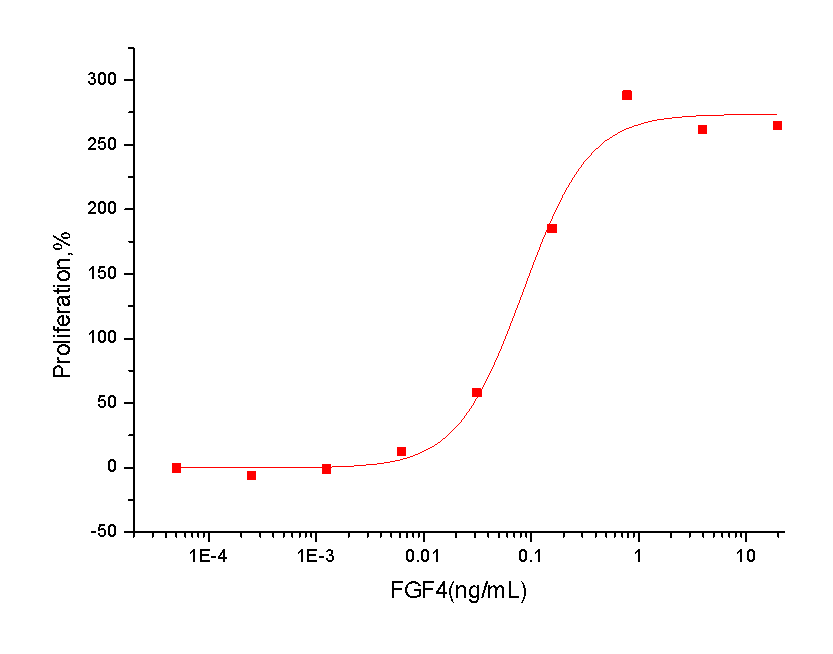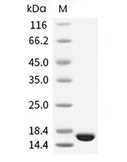 Your shopping cart is currently empty
Your shopping cart is currently empty
FGF-4 Protein, Human, Recombinant
FGF (fibroblast growth factor) signalling is known to be required for many aspects of mesoderm formation and patterning during Xenopus development and has been implicated in regulating genes required for the specification of both blood and skeletal muscle lineages. Fibroblast growth factor 4 (FGF4) signaling induces differentiation from embryonic stem cells (ESCs) via the phosphorylation of downstream molecules such as mitogen-activated protein kinase/extracellular signal-related kinase (MEK) and extracellular signal-related kinase 1/2 (ERK1/2). Fibroblast Growth Factor 4 (FGF-4) could not only increase the proliferation of bone marrow mesenchymal stem cells (BMSCs), but also induce BMSCs into hepatocyte-like cells in vitro. FGF4 transduced BMSCs contributed to liver regeneration might by the transplanted microenvironment. The FGF4-bFGF BMSCs thus can enhance the survival of the transplanted cells, diminish myocardial fibrosis, promote myocardial angiogenesis, and improve cardiac functions.

FGF-4 Protein, Human, Recombinant
| Pack Size | Price | USA Warehouse | Global Warehouse | Quantity |
|---|---|---|---|---|
| 5 μg | $54 | 7-10 days | 7-10 days | |
| 10 μg | $84 | 7-10 days | 7-10 days | |
| 20 μg | $136 | In Stock | In Stock | |
| 50 μg | $209 | 7-10 days | 7-10 days | |
| 100 μg | $296 | 7-10 days | 7-10 days | |
| 200 μg | $523 | 7-10 days | 7-10 days |
Product Information
| Biological Activity | Measured in a cell proliferation assay using Balb/c 3T3 mouse fibroblasts. The ED50 for this effect is typically 0.04-0.2 ng/mL.  |
| Description | FGF (fibroblast growth factor) signalling is known to be required for many aspects of mesoderm formation and patterning during Xenopus development and has been implicated in regulating genes required for the specification of both blood and skeletal muscle lineages. Fibroblast growth factor 4 (FGF4) signaling induces differentiation from embryonic stem cells (ESCs) via the phosphorylation of downstream molecules such as mitogen-activated protein kinase/extracellular signal-related kinase (MEK) and extracellular signal-related kinase 1/2 (ERK1/2). Fibroblast Growth Factor 4 (FGF-4) could not only increase the proliferation of bone marrow mesenchymal stem cells (BMSCs), but also induce BMSCs into hepatocyte-like cells in vitro. FGF4 transduced BMSCs contributed to liver regeneration might by the transplanted microenvironment. The FGF4-bFGF BMSCs thus can enhance the survival of the transplanted cells, diminish myocardial fibrosis, promote myocardial angiogenesis, and improve cardiac functions. |
| Species | Human |
| Expression System | E. coli |
| Tag | Tag Free |
| Accession Number | P08620 |
| Synonyms | K-FGF,KFGF,HSTF1,HST-1,HST,HBGF-4,fibroblast growth factor 4 |
| Construction | A DNA sequence encoding the human FGF4 (NP_001998.1) (Ser54-Leu206) was expressed. Predicted N terminal: Met |
| Protein Purity | ≥ 95 % as determined by SDS-PAGE. ≥ 95 % as determined by SEC-HPLC.  |
| Molecular Weight | 16.92 kDa (predicted) |
| Endotoxin | < 10 EU/mg of the protein. |
| Formulation | Lyophilized from a solution filtered through a 0.22 μm filter, containing PBS, pH 7.4. Typically, a mixture containing 5% to 8% trehalose, mannitol, and 0.01% Tween 80 is incorporated as a protective agent before lyophilization. |
| Reconstitution | Reconstituted with sterile deionized water to 0.25 mg/mL. Reconstitution conditions may vary depending on the lot. |
| Stability & Storage | It is recommended to store recombinant proteins at -20°C to -80°C for future use. Lyophilized powders can be stably stored for over 12 months, while liquid products can be stored for 6-12 months at -80°C. For reconstituted protein solutions, the solution can be stored at -20°C to -80°C for at least 3 months. Please avoid multiple freeze-thaw cycles and store products in aliquots. |
| Shipping | In general, Lyophilized powders are shipping with blue ice. |
| Research Background | FGF (fibroblast growth factor) signalling is known to be required for many aspects of mesoderm formation and patterning during Xenopus development and has been implicated in regulating genes required for the specification of both blood and skeletal muscle lineages. Fibroblast growth factor 4 (FGF4) signaling induces differentiation from embryonic stem cells (ESCs) via the phosphorylation of downstream molecules such as mitogen-activated protein kinase/extracellular signal-related kinase (MEK) and extracellular signal-related kinase 1/2 (ERK1/2). Fibroblast Growth Factor 4 (FGF-4) could not only increase the proliferation of bone marrow mesenchymal stem cells (BMSCs), but also induce BMSCs into hepatocyte-like cells in vitro. FGF4 transduced BMSCs contributed to liver regeneration might by the transplanted microenvironment. The FGF4-bFGF BMSCs thus can enhance the survival of the transplanted cells, diminish myocardial fibrosis, promote myocardial angiogenesis, and improve cardiac functions. |
Dose Conversion
Calculator
Tech Support
| Size | Quantity | Unit Price | Amount | Operation |
|---|

Copyright © 2015-2026 TargetMol Chemicals Inc. All Rights Reserved.



